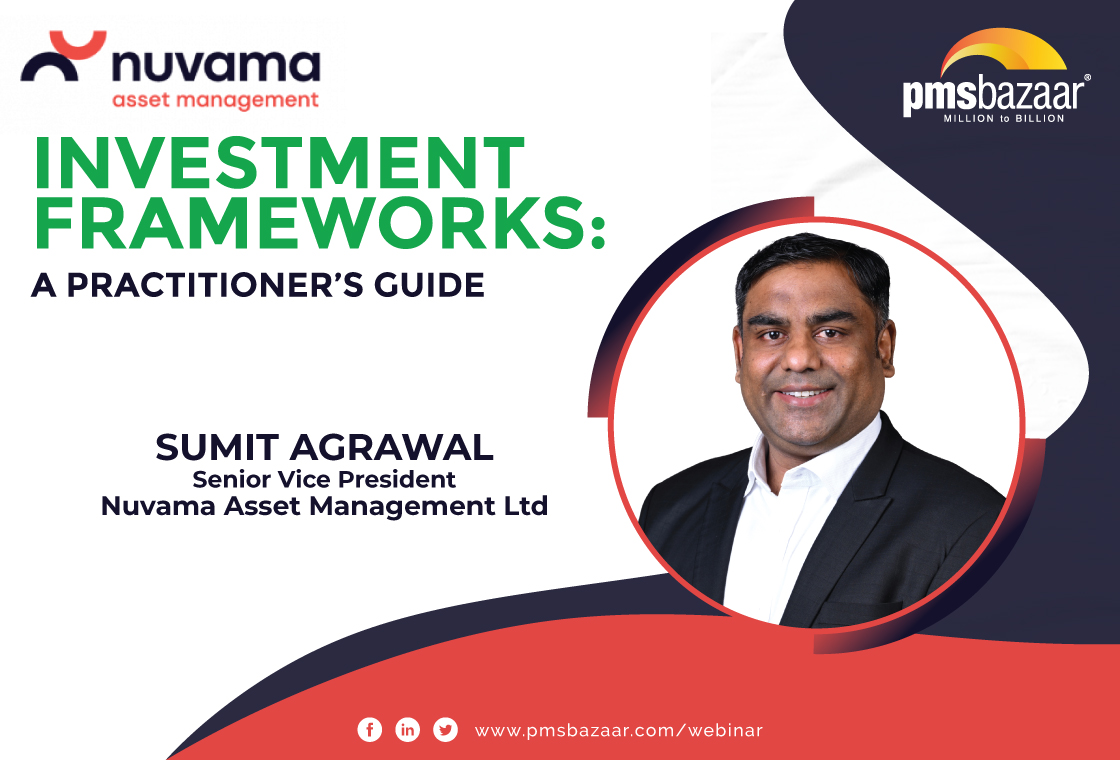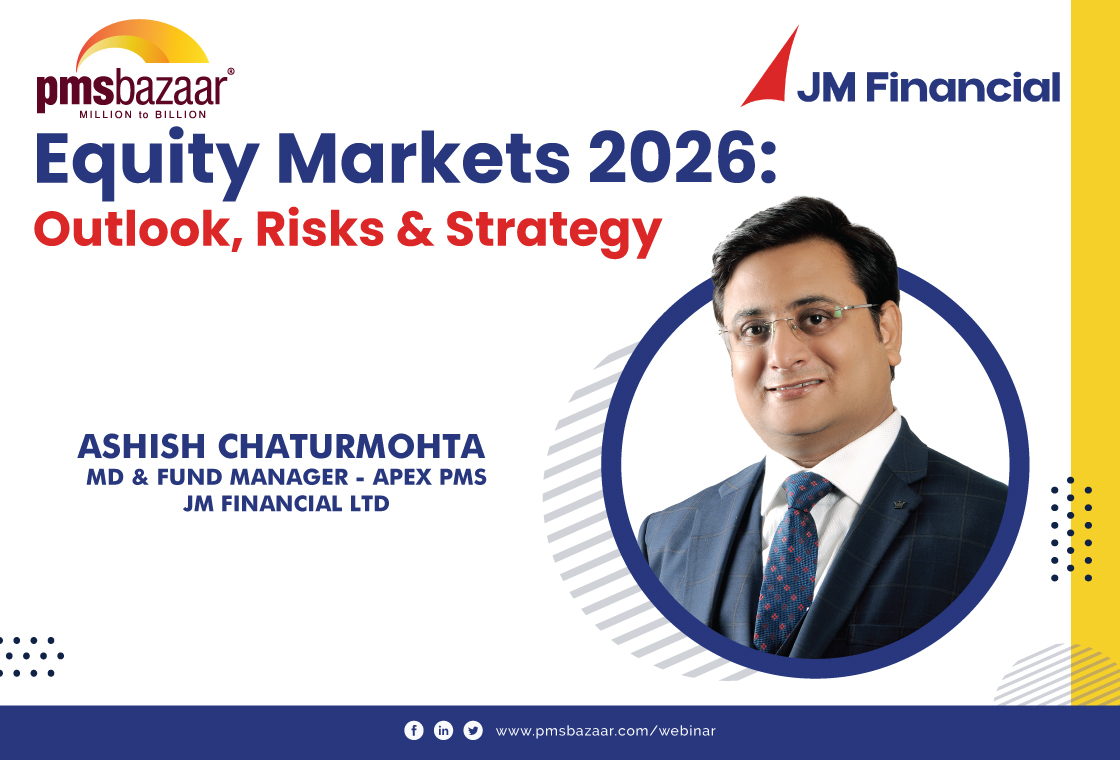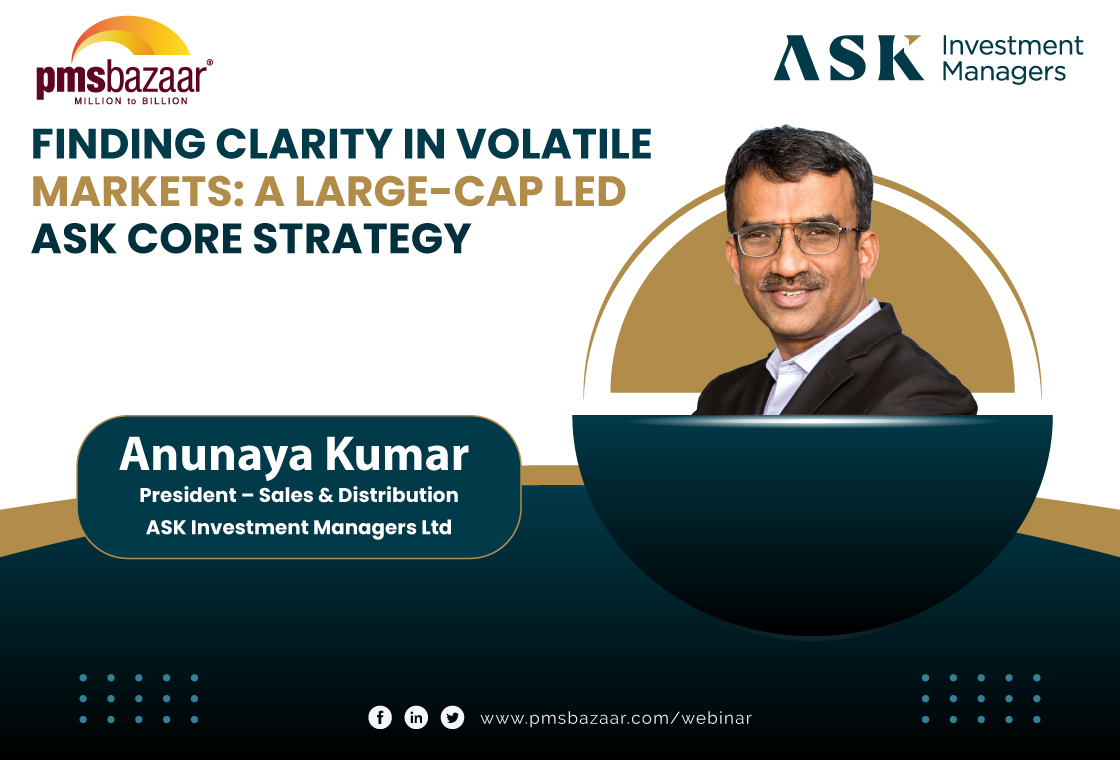PMS Bazaar recently organized a webinar titled “A Deep Dive into the Early Stage Startup Ecosystem and Investment Strategies”, which featured Dr. Mark Mobius, Founder of Mobius Capital Partners, and Mr. Rajesh Sehgal, Managing Partner of Equanimity Investments. This blog covers the important points shared in this insightful webinar.

In the world of venture capital and private equity, where opportunities abound, investors often find themselves treading cautiously. Mr. Rajesh Sehgal sheds light on the intricacies of early-stage investments, the evolving landscape, and the unique opportunities it presents. He explores key factors that investors should consider when venturing into this dynamic sector.
Key aspects covered in the webinar are
- India: A Beacon of Opportunity
- The changing landscape of unlisted opportunities
- Why India presents a lucrative opportunity
- Spotlight on the funding winter
- Seizing opportunities in challenging times
- Investment evaluation criteria
- Choosing the right investment strategy
- The journey of a startup
- Navigating valuation challenges
- The importance of co-investment
- Learning from mistakes
India: A Beacon of Opportunity
Dr. Mobius was asked about the intriguing shift in the startup ecosystem that emerged when comparing funding statistics between 2022 and 2023. The funding, which once soared to USD 19.3 billion, experienced a significant dip to USD 4.4 billion in just seven months into 2023. Addressing this concerning decrease in startup funding, Dr. Morbis offered valuable insights.
According to Dr. Mobius, this downturn is a temporary phenomenon, primarily influenced by broader issues affecting emerging markets. The capital markets, especially those related to emerging economies, have been experiencing fluctuations due to the ongoing situation in China. As many investors closely monitor the emerging markets index, it's evident that a substantial portion of this index is tied to China, constituting around 30%.
This high reliance on China's performance can create uncertainty and unease among investors when China faces challenges or slowdowns. Dr. Morbis emphasized that the decline in funding for Indian startups should be seen in this context – a ripple effect from broader concerns about emerging markets rather than an intrinsic flaw in India's startup ecosystem.
Dr. Morbis's optimism shines through when he discusses the future of India's startup landscape. He firmly believes that India is on an upward trajectory, moving from strength to strength. He points to India's exceptional growth potential over the next 10, 15, and 20 years, highlighting the significant difference in performance between India and China – the two most populous nations in emerging markets.
In Dr. Morbis's view, the current slowdown in funding for startups is a temporary hiccup. As global investors awaken to India's immense potential, there will be a renewed influx of capital into the country. This surge won't be limited to startups but will extend to venture capital investments and industrial ventures. Notably, he mentions the semiconductor and hardware industry, with giants like Apple showing interest in diversifying their manufacturing away from China and towards India. Dr. Morbis firmly believes that the future is exceptionally bright for India, with an expanding ecosystem of startups and venture capital on the horizon.
The Changing Landscape of Unlisted Opportunities
Understanding the Global Scenario
In the ever-evolving world of unlisted opportunities, early-stage investments have taken center stage. Mr. Rajesh Sehgal emphasizes the seismic shift in the private equity and venture capital landscape, which now boasts a substantial share of the global economy. Notably, the venture capital sector, which was once modest, has grown to a staggering USD 2.6 trillion. What's even more compelling is the expected return on investments, with a median of 25% IRR—a figure that outshines most other asset classes.
Why India Presents a Lucrative Opportunity
The Indian Advantage
While the global landscape is enticing, Mr. Rajesh Sehgal sees India as an even more promising frontier. He cites factors such as the country's vast internet user base, familiarity with digital technologies, and groundbreaking initiatives like UPI (Unified Payments Interface) as indicators of India's potential. With a vision for the future, Sehgal believes that India will continue to foster new business models and technologies, transforming the way we live and do business.
Spotlight on the Funding Winter
Understanding Market Cycles
One cannot discuss early-stage investments without addressing the ever-present market cycles. Mr. Rajesh Sehgal acknowledges the funding winter—a period when capital becomes scarce, particularly for technology companies and unlisted VC ventures. However, he assures investors that this is a temporary phase, echoing the sentiments of renowned investor Dr. Mobius. The cyclical nature of the market indicates that the ecosystem is poised for an upswing, making 2023 a pivotal year for investors.
Seizing Opportunities in Challenging Times
Investing with Precision
As the saying goes, "The best time to invest is when there's blood on the street." Mr. Rajesh Sehgal encourages investors to take advantage of the current market conditions, which present attractive opportunities for early-stage investments. Notably, he points out that valuations are currently reasonable, further bolstering the case for investing in startups.
Investment Evaluation Criteria
Diving into the Details
For those considering early-stage investments, Sehgal offers valuable advice on evaluating opportunities. Key factors include:
• Founder and Team: Spending time with the founding team is crucial. Understanding their background, expertise, and commitment to the venture is paramount.
• Founder Assessment: When evaluating founders, investors should scrutinize their experience, track record, and vision. Additionally, assessing the alignment of the founders' goals with the investor's vision is critical.
• Technology: Technology remains a pivotal aspect of evaluating startups. In today's landscape, even traditional industries require a tech-driven approach for growth.
• Tech Stack Evaluation: Investors should assess the quality and scalability of the technology stack employed by the startup. Understanding the startup's technological advantage is crucial for long-term success.
• Traction: Assessing a startup's growth trajectory is vital. Demonstrated traction and a clear path to value creation are essential components.
• Growth Metrics: Investors should closely examine key growth metrics, such as user acquisition, revenue growth, and market expansion. A startup's ability to execute and deliver results is a strong indicator of its potential.
• Financials: Evaluating early-stage company financials requires a different approach compared to traditional investments. Investors must adapt to the unique financial metrics associated with startups.
• Financial Due Diligence: Conducting thorough financial due diligence is essential. Investors should focus on metrics such as burn rate, runway, and revenue projections. It's imperative to understand the startup's financial health and its plans for sustainable growth.
Choosing the Right Investment Strategy
Formulating Your Approach
Investors have various strategies when it comes to startup investments. While some focus on portfolio size, sector specialization, or geographic location, Sehgal advises having a clear and stable investment strategy. Regardless of the approach, aligning investments with a well-defined strategy is crucial.
• Sector Focus: Investors can opt for sector-specific strategies, concentrating their investments in industries they are knowledgeable about or passionate about. For instance, focusing solely on fintech or health-tech startups.
• Geographic Focus: Some investors prefer a geographic focus, targeting startups in specific regions or countries where they have expertise or market insights.
• Stage Focus: Deciding whether to invest in early-stage startups or late-stage, more mature companies is another critical consideration. Each stage has its unique risk-reward profile.
The Journey of a Startup
Understanding the Business Life Cycle
Every successful company, whether Infosys or a neighborhood startup, begins as a small, ambitious venture. Mr. Rajesh Sehgal emphasizes that even the largest corporations started as startups. Understanding the evolution of a business—from inception to scaling, raising capital, and eventually going public—is essential for investors.
• Startup Phase: This is where it all begins. A startup identifies a problem, develops a solution, and sets out to capture a market. Investors in this phase focus on the founding team and the market potential of the idea.
• Growth Phase: Successful startups experience rapid growth. They secure funding to scale their operations, expand their customer base, and increase their market share. Investors in this phase assess scalability and the startup's ability to maintain growth.
• Late-stage and Exit Phase: By this stage, startups may seek additional rounds of funding, strategic partnerships, or even prepare for an IPO or acquisition. Investors here are interested in the startup's financials, market positioning, and potential exit opportunities.
Navigating Valuation Challenges
Art and Science of Valuation
Valuation in the early-stage startup space is a blend of art and science. Unlike established companies with robust financials, startups lack extensive data and track records. Sehgal advises investors to approach valuations with caution, keeping in mind that fair valuations often depend on perspective and timing.
• Methods of Valuation: Investors use various methods to value startups, including the Discounted Cash Flow (DCF) method, the Comparable Company Analysis (CCA) method, and the Risk-Adjusted Return method. Each has its strengths and limitations, and investors often use a combination of these approaches.
• Valuation Drivers: Understanding the drivers of valuation is crucial. Factors like market size, growth potential, competitive landscape, and the strength of the founding team play a significant role in determining a startup's value.
• Negotiation and Terms: Investors should be prepared to negotiate terms and conditions with founders. These negotiations can impact the investor's level of influence, equity stake, and rights within the startup.
The Importance of Co-Investment
Collaborating for Success
Co-investment opportunities are a win-win for investors and startups alike. Sehgal highlights the value that co-investors bring to the table. Investors should look for co-investment opportunities that align with their commitment to the fund and their ability to add value to the startup.
• Diversification: Co-investing allows investors to diversify their portfolios and spread risk across multiple startups. This can be particularly beneficial in the high-risk, high-reward world of early-stage investing.
• Expertise Sharing: Co-investors often bring unique expertise, networks, and resources to the table. Collaborating with other investors can enhance a startup's chances of success.
• Due Diligence: Co-investors can complement each other's due diligence efforts, providing a more comprehensive assessment of the startup's potential and risks.
Learning from Mistakes
Embracing the Learning Curve
No investment journey is without its share of challenges. Mr. Rajesh Sehgal acknowledges that mistakes are part of the process. The key is to learn from them, adapt, and make informed decisions as we advance. By doing so, investors can navigate the complexities of early-stage investments with resilience and wisdom.
• Risk Mitigation: Learning from past mistakes allows investors to refine their risk mitigation strategies. It's essential to continuously assess and adapt your investment approach based on lessons learned.
• Staying Informed: The investment landscape is dynamic, and staying informed about market trends, regulatory changes, and emerging technologies is crucial. Being proactive in seeking knowledge and insights is a valuable aspect of the learning curve.
Mr. Rajesh Sehgal covered all the topics mentioned above in-depth and answered many more questions from the audience toward the end of the session. For more such insights on this webinar, watch the recording of this insightful session through the appended link below:
Get access to rich data and analytics of PMS & AIF by subscribing to us. Join the 50000+ investors & experts now: Subscribe NOW
Recent Blogs

January Rout, Extreme Dispersion: PMS Returns Swing From Losses to Gains
Benchmark falls deepened losses, but multi-asset and debt cushioned portfolios meaningfully

Investment Frameworks : A Practitioner’s Guide
PMS Bazaar recently organized a webinar titled “Investment Frameworks: A Practitioner’s Guide,” which featured Mr. Sumit Agrawal, Senior Vice President, Nuvama Asset Management Limited. This blog covers the important points shared in this insightful webinar.

Aurum Multiplier Portfolio - Where Small and Mid-Cap Alpha Meets Large-Cap Stability
PMS Bazaar recently organized a webinar titled “Aurum Multiplier Portfolio - Where Small and Mid-Cap Alpha Meets Large-Cap Stability,” which featured Mr. Sandeep Daga, MD& CIO, Nine Rivers Capital and Mr. Kunal Sabnis, Portfolio Manager, Nine Rivers Capital. This blog covers the important points shared in this insightful webinar.

Flat Markets, Wide Outcomes: How 484 PMS Strategies Performed in Dec 2025
December 2025 was a month where market returns stayed close to flat, with the Nifty 50 TRI at -0.28% and the BSE 500 TRI at -0.24%.

Equity Markets 2026: Outlook, Risks and Strategy
PMS Bazaar recently organized a webinar titled “Equity Markets 2026: Outlook, Risks and Strategy,” which featured Mr. Ashish Chaturmohta, MD & Fund Manager – APEX PMS, JM Financial Limited. This blog covers the important points shared in this insightful webinar.

MICRO CAPS: The Dark Horses of the Indian Equity Market
PMS Bazaar recently organized a webinar titled “MICRO CAPS: The Dark Horses of the Indian Equity Market,” which featured Mr. Rishi Agarwal and Mr. Adheesh Kabra, both Co-Founders and Fund Managers, Aarth AIF. This blog covers the important points shared in this insightful webinar.

Finding Clarity in Volatile Markets: A Large-Cap Led ASK CORE Strategy
PMS Bazaar recently organized a webinar titled “Finding Clarity in Volatile Markets: A Large-Cap Led ASK CORE Strategy,” which featured Mr.Anunaya Kumar, President – Sales and Distribution ASK Investment Managers Limited. This blog covers the important points shared in this insightful webinar.
.jpg)
Passively Active Investing — A Modern Investor’s Lens on ETF-Based PMS
PMS Bazaar recently organized a webinar titled “Passively Active Investing — A Modern Investor’s Lens on ETF-Based PMS,” which featured Mr. Karan Bhatia, Co-Founder and Co-Fund Manager , Pricebridge Honeycomb ETF PMs. This blog covers the important points shared in this insightful webinar.

